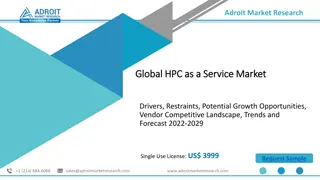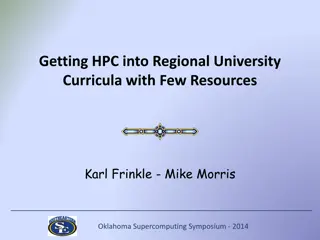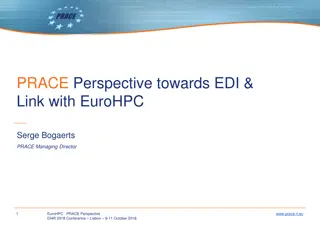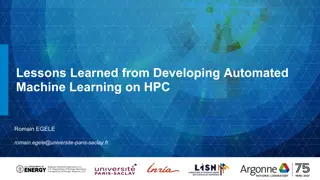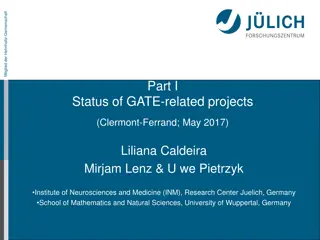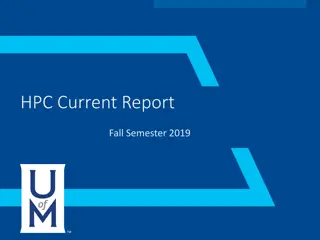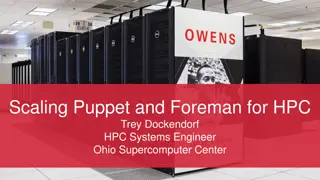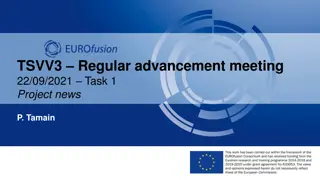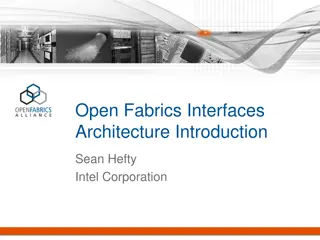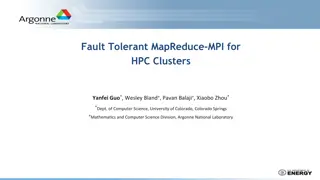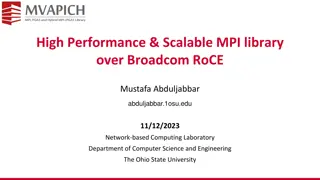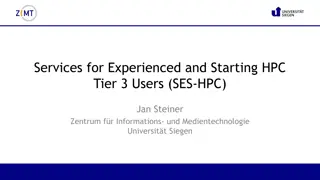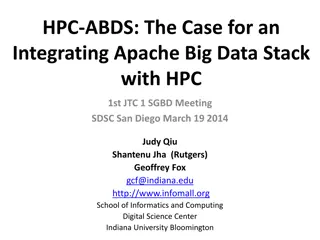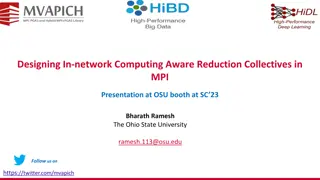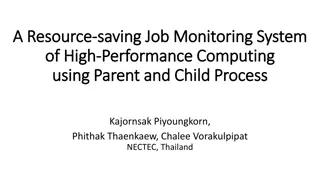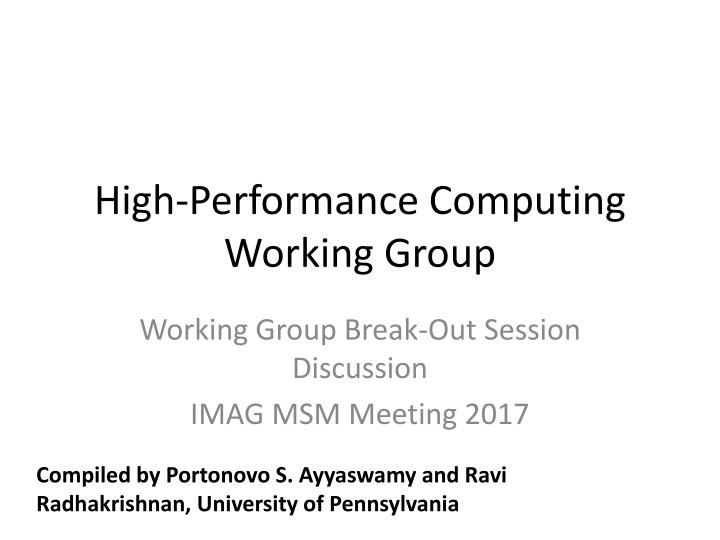
High-Performance Computing Discussion and Activities Overview
Explore the goals and activities of the High-Performance Computing Working Group, focusing on collaborative initiatives, multi-scale modeling, computational algorithms, and infrastructure for parallel computing. Discover the group's efforts in organizing webinars, workshops, and information sessions to enhance shared knowledge and performance in HPC.
Download Presentation

Please find below an Image/Link to download the presentation.
The content on the website is provided AS IS for your information and personal use only. It may not be sold, licensed, or shared on other websites without obtaining consent from the author. If you encounter any issues during the download, it is possible that the publisher has removed the file from their server.
You are allowed to download the files provided on this website for personal or commercial use, subject to the condition that they are used lawfully. All files are the property of their respective owners.
The content on the website is provided AS IS for your information and personal use only. It may not be sold, licensed, or shared on other websites without obtaining consent from the author.
E N D
Presentation Transcript
High-Performance Computing Working Group Working Group Break-Out Session Discussion IMAG MSM Meeting 2017 Compiled by Portonovo S. Ayyaswamy and Ravi Radhakrishnan, University of Pennsylvania
High-Performance Computing (HPC) WG Goals Initiate discussion, foster collaboration, share know-how on (but not limited) to: Computational resources and infrastructure for HPC Multi-scale modeling and simulations on emerging computer architectures (e.g. GPUs, Many-cores and Multicore- architectures). Computational algorithms, libraries, tool-kits and software. Infrastructure and strategies to handle parallel computations, big-data problems. Develop a repository where toolkits that are already available are maintained for use by the community and thus avoid a repetitive rework. Advocating for multistep workflows that incorporate large scale simulation experiments (both distributed and embarrassingly parallel) that generate very large data sets that can be subjected to advanced machine learning and evolutionary computing methods, either as part of the workflow or for post-hoc analysis
Summary of WG Activities (2016-17) Organized webinars on High Performance Computing Topics Bridging Multiple Scales in Modeling Targeted Drug Nanocarrier Delivery Low resolution models for mesoscale structure and thermodynamics of soft materials Conducted workshops (local, national) on High Performance Computing topics and publicized within MSM consortium D^3: Deformation, Defects, Diagnosis Symposium, Penn, Philadelphia (2016, 1.5 days) Emerging Paradigms of Scientific Discovery (2017, 1.5 Days) Information sessions on HPC-related topics Life Sciences on High Performance Computing (HPC) Environment IMAG Multiscale Modeling Funding Opportunity - Informational Webinar
Summary of HPC WG Discussion Need for shared knowledge and know-how of HPC resources, new HPC architectures, techniques/tricks for HPC code development, expectation for performance-enhancement, scale-up, and time-investment Documentation on WIKI with links White papers on key discussion items Peer-reviewed publications, reviews, and monographs on topics Wiki page is updated with news of HPC workshops on a regular basis (1/3 Key Points)
Summary of HPC WG Discussion Making distinction between traditional biomed Big-Data Problems from Big Computations on Distributed Computing (embarrassingly parallel) problems from Massively Parallel Computing Problems and High-throughput computing involving multistep workflows (which will include advanced Big Data analysis => Deep Machine Learning and Adaptive Model Exploration [e.g, Evolutionary Computing/GA]) Updated knowledge-base on key issues related to the three paradigms on WIKI Invite investigators specializing in these paradigms to give Webinars and initiate discussion Collocation of workshops. Invite Personnel from HPC centers (XSEDE or DOE) to give webinars Organize talks at meetings, conferences on HPC issues (2/3 Key Points)
Summary of HPC WG Discussion Collective initiatives/bargaining of HPC resources for MSM U01 Awardees Can we write proposals as a consortium to obtain access to HPC computing facilities, HPC support? E.g., Joint XSEDE proposal or DOE INCITE proposal? Ask IMAG Leadership to approach DoE to engage as part of the Biological Applications of Advanced Computing (BAASIC) initiative https://baasic.llnl.gov/ Can this be programmed into the grant administration of the U01 awards (e.g. can Dr. Grace Peng arrange for HPC allocation for MSM U01 awardees?) Are there other HPC resources outside of the Usual XSEDE, DOE (or amazon cloud) that consortium members can avail of? There is a critical need to increase our access to HPC resources (3/3 Key Points)
Questions to be Addressed and Todays Discussion Drs. Saleet Jafri and Andrew McCulloch as part of MSM Steering Committee sent us questions in trying to help improve the MSM working groups (WG). We now answer the questions as follows: i. Have your goals and objectives changed (from what is posted on the wiki)? Slightly broadened. ii. What obstacles did you have in achieving them? Our webinars were not hugely popular outside of our own WG participation. This concern was addressed by having two workshops. iii. What have you accomplished? Broad outreach has been accomplished. High performance computing has changed from traditional parallel to modern GPU and many-core architecture etc. We have informed WG of GPU links and related events by posting on wiki. iv. How active is your WG? Noting the high participation in the second workshop conducted on the campus of UPENN in 2016, it is evident that our WG is very successful v. How can your WG improve? Propose co-lead for our WG. Dr. Shawn Brown of the Pittsburgh SCC. This way with Ravi from academia and Shawn from super computer center would jointly be able to guide the vision of this WG towards modern GPU based computing. Disseminating multi-workflow management environments that facilitate HPC simulation experiments to the general IMAG group
vi. How would you suggest evolving your WGs (merging, separating, etc.)? We do not plan on merging. If at all, it may be with the Theoretical and Computational Methods Group and that may not be optimal either. But, this WG will interface with other groups, particularly with TCMG to explore common objectives. This was a suggestion from Dr. Saleet Jafri. vii. What are your target journals of published papers? JCP and PLOS computational biology as of now. viii. What special issues have you already done? None as of now. ix. Would you be interested in creating a database of MSM papers collection on the web? At the moment we have not thought about this. x. The 2017 steering committee has the goal to deliver two position papers with the WGs. One would be a "position paper" for a general audience and on targeted toward modelers. The WG proposed position paper to introduce and describe multistep workflows that involve large scale simulation experiments with advanced large scale data analysis (ML/EC/GA for optimization/control and metamodel identification), and how this would be a natural evolution of MSM development and use. xi . Are there existing seminal reviews for the community served by their WG? Yes. It is on the wiki. One article is about the molecular scale (Ravi) and the other is about 100 years of Brownian motion (GK).
a. These reviews could be referenced in the position papers Yes. b. Post on wiki and to provide pointers for graduate students Done. xii. Please compile a list target journals of published papers for each WG and a list editors of journals from WGs JCP, PLOS computational biology. xiii. What has the WG s already done with special issues? xiv. We are planning as of now.
Want to Join the Group? And/or do you have suggestions for High- Performance Computing related issues/activities? Please email Ravi Radhakrishnan, UPENN: rradhak@seas.upenn.edu Please post your comments on the IMAG WIKI page

